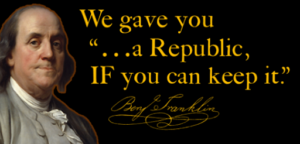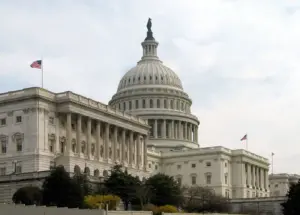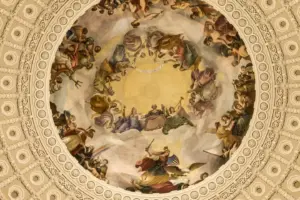If you want to save yourself the bother of reading these two Posts – this is, after all, an American national holiday weekend, and even now I can smell the burgers and brats on the grill – here are my conclusions:
Christian Patriotism:
Christian Nationalism:
Now, for any who are still with us and care to investigate further, here’s what we’re going to cover in the next two weeks:
This Week:
1 Christian Patriotism
2 What is Christian Nationalism? We need to define this carefully.
3 What is Evangelical Christianity?
4 Was the United States founded as a Christian country?
Next Week:
Why does Christian Nationalism exist? What to make of it. Its dangers. * The Orthodox approach to Church and State.
- Preview: Q, “What do you get when you mix religion and politics?” A. “Politics”
1 What does Orthodoxy think of patriotism?
We’re all for it!
Patriotism is a good thing: loving, treasuring one’s homeland and people, a sense of belonging, our own way of doing things, our particular gifts from God.
We Americans have much to be patriotic about * – much for which we should be grateful to God, things we so easily take for granted:
- We’re certainly not alone in this. For example, our brothers and sisters here in North America who celebrated Canada Day on July 3. And the people in Greece, where I’ve spent quite a bit of time, are passionately Greek.
1 Political stability for almost 250 years. Despite huge changes in society, threatening events including a civil war, some major missteps and failings, and occasional ignorant or malevolent politicians, the system (albeit creaky at the moment) still stands in this Year of Our Lord 2024. (Check in with me next year about this.) America’s Founding Fathers were brilliant visionaries in this regard. Imagine anyone today fashioning a form of representative government that would still be around in the year 2244.

2 Our freedoms – elected government, freedom of worship, of speech, assembly, the press. We have often been slow to apply these God-given rights, as the Founders described them, to women and minorities. It’s still a struggle, and these freedoms are not infrequently under attack, but we’ve made progress.
3 Peace. In some parts of the world there is little peace for anybody. Here, despite occasional strife brought on by rabble-rousers, or because of injustice toward minorities, people of many sorts generally get along together. Our Milwaukee Orthodox Churchwomen’s Association, which includes many Greeks, has held luncheons at a Turkish restaurant!
4 America’s capacity to be a magnet to needy people from all over the world – perhaps including some of you who follow this Blog – and provide a refuge for people from east, west and south, and incorporate them into our society. “America is a nation of immigrants.” All of us on this continent came from somewhere else – either we or our ancestors. Even the “Native Americans” came originally from Asia. They just got here before the rest of us.
In The Journals of Father Alexander  Schmemann * he wrote how he and his wife Juliana came to America as immigrants – she not speaking a word of English – and 25 years later he was Dean of Saint Vladimir’s Seminary and she was made head of one of New York’s most prestigious schools for girls. He wrote, “The American dream is still alive!”
Schmemann * he wrote how he and his wife Juliana came to America as immigrants – she not speaking a word of English – and 25 years later he was Dean of Saint Vladimir’s Seminary and she was made head of one of New York’s most prestigious schools for girls. He wrote, “The American dream is still alive!”
* Have you read this? You should.
https://www.svspress.com/journals-of-father-alexander-schmemann-the/ or you can get it from Amazon.
A few years ago there was a pop “country” song titled “I’m proud to be an American”. That’s the wrong way to say it.
Here’s the right way: “I’m grateful to be an American.”
What is Christian Nationalism?
In what follows here and for the rest of the next two Posts, I am very grateful for the help provided by my granddaughter who is now doing an independent summer study project on Christian Nationalism at Saint Olaf’s College in Minnesota. My dear wife has also assisted.
I think it was Will Cuppy who defined a philosopher as “someone who goes around telling people to define their terms”. Well, that is a good idea. I think most of the misunderstandings in this world are caused by people using the same words to mean quite different things.
So, to begin:
Don’t confuse Christian Nationalism with normal Patriotism, as described above.
Don’t confuse Christian Nationalism with the responsibility of Christians to make our voices heard in “the public forum” and apply the teachings of Christ and the Church to American national life. Christians have often done this. For example, Christians led the way in outlawing slavery in the Nineteenth Century, and in the civil rights movement of the 1960s.
Don’t confuse Christian Nationalism with the desire of Evangelical Christians * who, by word, vote and example, simply hope to establish a conservative society.
- Later in today’s Post we’ll try to define “Evangelical Christian”, which is not easy.
The term Christian Nationalism refers to an organized movement, grounded in Dominionism, which has the intent to gain control of American society, from the top down. Here, I believe, is an accurate concise definition (by Frederick Carlson for Political Research Associates, November 4, 2022).
” Dominionism is one of the most significant, yet little-known ideological forces in the U.S. and increasingly, globally. This theological idea has been gathering strength for a half century and is transforming conservative evangelical Christianity into political movements that are driving contemporary politics.
” We currently see Dominionism-informed conservative Christian support for political candidates at all levels, from school boards to the presidency.
” Here are the three main features of Dominionism:
- Dominionism can be summarized as the theocratic idea that Christians are called by God to exercise dominion over every aspect of society…

Colorado Springs political pastor Steve Holt explains Dominionism …by taking control of political and cultural institutions: for example, over the role of government, the form and content of public education, and eliminating rights related to bodily autonomy. It envisions a very different society than one defined by democratic aspirations and equality for all people.
- Dominionism is the key element of contemporary notions of Christian nationalism—the belief that the U.S. once was, and should again be, a Christian nation. This narrative denies the Enlightenment roots of American constitutional democracy. Dominionism is the underlying ideology that gives an agenda to Christian nationalism.
- Dominionism promotes religious supremacy, insofar as it does not respect the equality of other religions, or even other versions of Christianity. Dominionism also promotes theocratic visions of governance, insofar as it supports the idea that the Ten Commandments, or “biblical law,” should be the foundation of American law, and that the U.S.Constitution should be seen as a vehicle for implementing biblical principles.”
How many Americans endorse or sympathize with the Christian Nationalist movement?
According to the following PRRI study, about 30% sympathize, and 10% are directly involved. See: https://www.prri.org/research/support-for-christian-nationalism-in-all-50-states/
Here is an impartial explanation of the above from Religion News Service: https://www.axios.com/2024/02/28/poll-christian-nationalism-americans-reject#
And another from The Baptist Standard: https://www.baptiststandard.com/news/nation/how-widespread-is-christian-nationalism-its-complicated/
However, according to Pew Research, about half the country has never heard of Christian Nationalism, and only 5% have a favorable view of it. I don’t know what to make of the discrepancy. Often people give different answers when the same question is phrased differently. See: https://www.pewresearch.org/religion/2024/03/15/christianitys-place-in-politics-and-christian-nationalism/
The Christian Nationalist movement seeks to run every part of society, from school boards to national politics. Some of its chief advocates are churches. Here is an article – too long to include here – which, I think, gives a fair assessment of the growing effects of Christian Nationalism on politics and politicians. * Warning: It names names. If you don’t want to read about specifics, don’t open it.
https://www.axios.com/2024/06/24/christian-nationalism-america-trump-republicans.
What is Evangelical Christianity?
This is important:
1 Don’t paint all Evangelical Christians with the same brush.
Those who call themselves Evangelicals today range from radical independent Fundamentalists with no denominational “control system”, to the Evangelical Lutheran Church in America (ELCA) which is one of the most liberal denominations.
It would take an entire Post to tell you how Evangelicals and other Protestants got into this mess. And there is one! See: https://frbillsorthodoxblog.com/2018/07/06/73-orthodoxy-and-other-faiths-modern-protestantism-part-1-protestant-disunity-orthodox-unity/
2 Which kind of Evangelicals are behind the Christian Nationalist/Dominionism movement? Chiefly it’s people from some of the most radical (I won’t call them “conservative”) independent fundamentalist Evangelical churches which are of Twentieth Century origin. They claim to receive direct revelations and authority from God. They are politically conservative (by today’s shifting standards), and theologically…. oh, I don’t know what to call them. Except for the fact that they seem to believe in Jesus, they are a long way from the Orthodox theological and liturgical Tradition.
An example: Bethel Church, Redding, California, a mega-church with about 11,000 members and a gorgeous website. They are deeply involved in the Christian Nationalist movement. The pastor preaches politics and supports political candidates from the pulpit.
The following are two Sunday services at Bethel. One consists essentially of some songs and preaching: https://www.google.com/search?
The following is, I hope, an extreme example. Please check it out at 1:25 till the end. It’s a long way from the Evangelicalism I knew as a boy, and even farther away from John Calvin.
3 Evangelical Christianity changes its stripes every generation or two. When I was young, Evangelicals were of a mild a-political “give your heart to Jesus” sort – quite different from classical Reformation Evangelicals. Now many Evangelicals are so vehemently political that some have asked whether they are just hiding behind the veneer of Christianity.
My point is: What are Fundamentalist Political Evangelicals going to be like in the next generation? What will they want for the country? Will they turn liberal as the ELCA did? Will they become tyrannical?
Was the United States of America founded as a Christian Nation?
Finally, for today, let’s look at this primary premise of Christian Nationalism: that the United States was a Christian nation, and now evil forces are taking the country away from them.
The answer as always is: It depends what we mean by that. “Define your terms”.
1 If we mean: Were there many Christians in America at the time of the Revolution? The answer is: Nobody knows. There are no statistics – only semi-educated guesses. A Finke and Starke study guesses that “fewer than 1 in 5 Americans were active in church affairs” at that time. Membership was much higher in the 1800s because of The [Evangelical] Great Awakening. https://www.rutgersuniversitypress.org/the-churching-of-america-1776-2005/9780813535531/
2 If we mean: Did the Founders establish Christianity as the national religion? The answer is No.
The first Article of the Bill of Rights reads: “Congress shall make no law respecting an establishment of religion, or prohibiting the free exercise thereof;”
Article VI of the Constituion of the United States specifies that “no religious Test shall ever be required as a Qualification to any Office or public Trust under the United States.”
So if the intention of the Christian Nationalists is to establish * Christianity as the national religion, that can’t be done without overthrowing the fundamental documents of our system.
- or “re-establish”, as some of them erroneously think
3 If the question: is: Was there Christian influence on America’s Founders? the answer is Yes, because in Eighteenth Century Western society that’s just what one was – just as to be Greek today one is assumed to be Orthodox, or to be Lutheran in Sweden, whether one practices it or not. However, that doesn’t tell us much, because the kind of Christianity the Founders practiced ranged widely from Evangelical of the Eighteenth Century sort, to the liberal Anglicanism of the time, to “semi-Deism” (the belief that God has little involvement in human affairs), to essentially non-practicing, to Charles Carroll of Maryland who was Roman Catholic.
Here’s a portion of a long article (all of which is well worth reading) from The Heritage Foundation which makes the point that the Founders valued religion in general as necessary to a good society. When the author refers to “Orthodox Christians” he doesn’t mean us! Here is the conclusion:
America’s Founders did not want Congress to establish a national church, and many opposed establishments at the state level as well. Yet they believed, as George Washington declared in his Farewell Address, that of “all the dispositions and habits which lead to political prosperity, Religion and morality are indispensable supports. Moreover, almost without exception, they agreed that civic authorities could promote and encourage Christianity and that it was appropriate for elected officials to make religious arguments in the public square. There was virtually no support for contemporary visions of a separation of church and state that would have political leaders avoid religious language and require public spaces to be stripped of religious symbols.
So did America have a Christian Founding? History is complicated, and we should always be suspicious of simple answers to difficult questions. As we have seen, there is precious little evidence that the Founders were deists, wanted religion excluded from the public square, or desired the strict separation of church and state. On the other hand, they identified themselves as Christians, were influenced in important ways by Christian ideas, and generally thought it appropriate for civic authorities to encourage Christianity.
What do these facts mean for Americans who embrace non-Christian faiths or no faith at all? Although the Founders were profoundly influenced by Christianity, they did not design a constitutional order only for fellow believers. They explicitly prohibited religious tests for federal offices, and they were committed to the proposition that all men and women should be free to worship God (or not) as their consciences dictate.
For the full article, go to: https://www.heritage.org/political-process/report/did-america-have-christian-founding#:~:text=In%20some%20cases—for%20example,and%20articulated%20orthodox%20Christian%20ideas.
4 However, there was another significant non-Christian influence on America’s Founders: Ancient Greek humanistic philosophy and political theory.
In fact I think this was the chief inspiration for many (most?) of the Founders. Why do I think that?
1 For one thing, look at American national architecture.

When I look up into the dome of the Capitol Building I expect to see a Pantocrator, “Christ the Ruler”. Instead I see the Apotheosis of George Washington, looking for all the world like the Mother of God being assumed into Heaven. I’m not sure what to do with that theologically, but it’s certainly problematic!

2 The concepts and language found in our Founding Documents are more Greek than Biblical.
Here’s part of a short article from the Greek Reporter, July 4, 2024:
The ideas and practices that are celebrated on Fourth of July and that led to the development of the American democratic republic after 1776 owe a debt to the ancient civilization of Greece
All of America’s founding fathers had studied ancient Greek philosophers’ texts, drawing inspiration about morals, ethics, and the sense of independence, all fundamental principles of a democratic society.
The Founding Fathers, such as James Madison, Alexander Hamilton, and Thomas Jefferson, were well-versed in the works of ancient Greek philosophers like Aristotle and Polybius.
They embraced classical republicanism, which advocated for a balanced government structure with a focus on civic virtue, public participation, and the common good. The ideas of checks and balances, separation of powers, and the importance of a virtuous citizenry were all influenced by ancient Greek political thought.
The concept of natural law, which suggests that certain rights and principles are inherent to all human beings, was also present in ancient Greek philosophy.
Philosophers like Plato and Aristotle discussed the existence of universal principles that transcended man-made laws. These ideas of natural rights, including life, liberty, and property, were central to the American Revolution and found expression in documents such as the Declaration of Independence and the Constitution.
Plato, in particular, was an important influence, as he wrote about the importance of mixed government, an idea that is fundamental to both the development of the separation of powers and the Constitution.
Aristotle also wrote about the separation of powers as a crucial element in a republic.
As author Tom Jewett pointed out: “Thomas Jefferson admired many aspects of the ancient Greeks; he could read and speak the language [and] agreed with many of their precepts, such as the Greek idea that man is measure of all things.”

Jewett makes further reference to Jefferson whose humanistic beliefs were based on this Greek idea of man. Jewett says of Jefferson:
“This was the groundwork for his belief in humanism, which recognized no barriers to the use of the mind, and which sought to make all knowledge useful to man. Jefferson particularly admired the Greeks’ idea with respect to man’s relationship to himself.”
Jefferson was also influenced by the Greek philosophies of Epicures and the Stoics. He believed as Epicures that happiness was humanity’s main goal and it could be attained through moral and noble actions.
According to Jewett, Jefferson was of the mind that ideas about self-control, rationality, and moderation in life were ideals by which one should live, especially during difficult times. Such ideas were based on those of the Stoics.
Next Week: Christian Nationalism, Part Two
Week after Next: Saint Mary Magdalene
